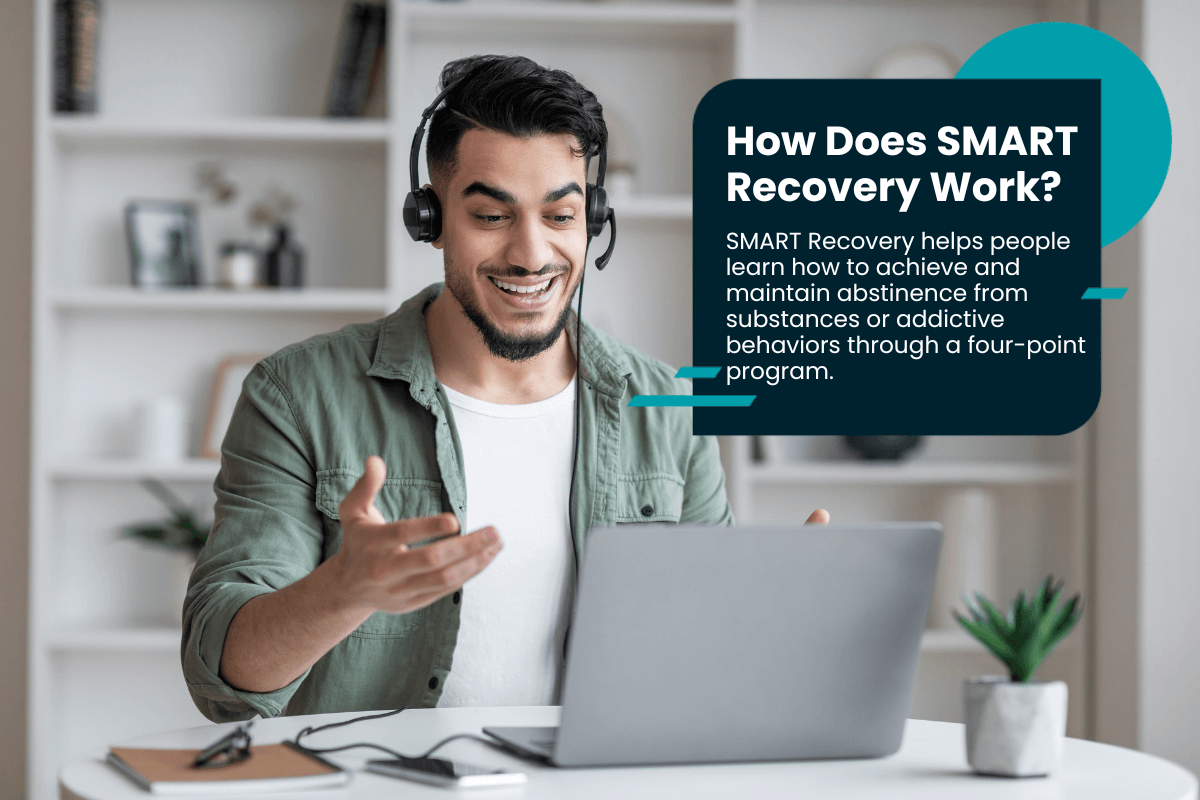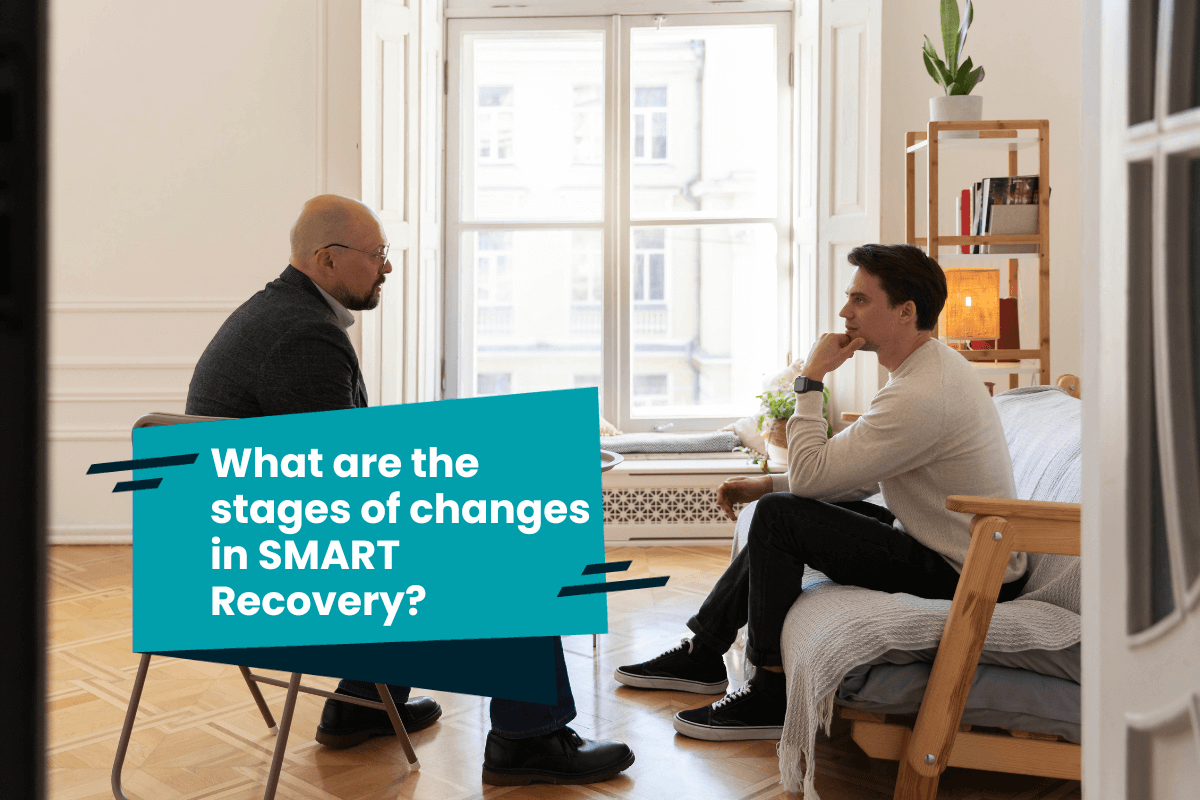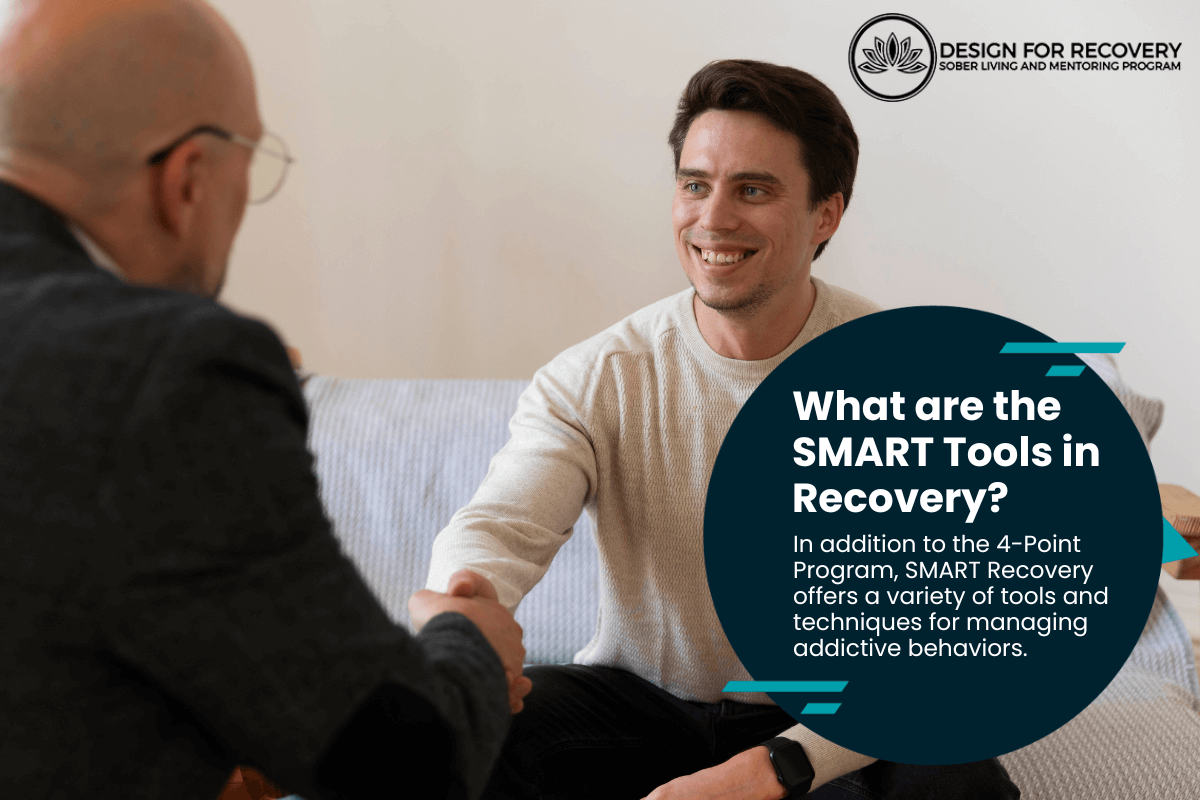Drug addiction is a serious issue that affects millions of individuals and their families. For those seeking effective treatment, SMART Recovery (Self-Management and Recovery Training) has proven invaluable in the fight against substance abuse. This program provides essential tools for recovery, including education, self-empowerment, and peer support. In this article, we’ll explore
Unlike most recovery programs, which focus on abstinence from drugs and alcohol, SMART Recovery promotes a balanced lifestyle that sets realistic goals for recovery. SMART Recovery recognizes that addiction is a condition that must be managed over time and offers tools for managing cravings and emotions and skills to prevent relapse. Look at what SMART recovery is and how it works for a drug addict.
What is SMART Recovery?
SMART Recovery (Self-Management and Recovery Training) is an evidence-based, abstinence-oriented approach to addiction recovery that emphasizes the individual’s self-empowerment. It’s an alternative to other 12-step programs like Alcoholics Anonymous (AA). The SMART Recovery program emphasizes self-reliance, support from nonjudgmental
SMART Recovery helps individuals understand their addiction and provides them with strategies for overcoming it. The program encourages participants to develop a personal plan that includes techniques such as problem-solving, goal-setting, lifestyle balance, self-care, and coping skills. It also emphasizes the importance of self-acceptance and learning how to manage triggers and cravings.
How Does SMART Recovery Work?

SMART Recovery helps people learn how to achieve and maintain abstinence from substances or addictive behaviors through a four-point program. The 4 points of the SMART recovery program are:
Building and Maintaining Motivation
Coping with Urges
Managing Thoughts, Feelings, and Behaviours
Living
The program utilizes cognitive-behavioral and motivational enhancement therapy tools to help individuals develop coping skills and strategies to sustain lasting recovery. By focusing on these four points of the SMART Recovery Program, people can gain the confidence and self-belief needed to overcome their addictions and lead fulfilling lives. This program is particularly popular among the youth, and studies show it supports good peer-reviewed addiction recovery.
SMART Recovery also offers online meetings and support groups, which can provide invaluable guidance and motivation for individuals in recovery. SMART Recovery also provides educational materials to help people learn more about their addiction and how to cope with it. Through these materials, people can develop a deeper understanding of their substance or addictive behaviors and gain insight into what steps they need to take to overcome them.
As a non-profit organization, SMART understands that making programs available is challenging, especially with a limited budget. They try to help overcome that barrier?by providing either Facilitator Training GSF201 or Family Friends Training GSF203?to volunteers or staff at a significantly reduced rate so places are equipped to host a SMART recovery meeting. Sometimes, you can even find a flash sale on SMART training.
Call Design for Recovery to Begin Your Healing Journey!
Reach out to our team to discuss sober living options and next steps toward a healthier routine.
How to join SMART Meetings?
Joining SMART Recovery meetings is easy. All you need to do is find an arrangement that works for your schedule and join. You can check out the meeting locator on the SMART Recovery website to find one in your area. Once you’ve found a meeting, you can contact the facilitator to get more information about how to join.
SMART Recovery meetings are held in person and virtually via teleconferences or online chats. Depending on your needs and preferences, you can choose between an in-person or virtual meeting. Each meeting offers a supportive environment where people share their experiences with addiction recovery and receive support from others in the group.
You don’t have to commit to a regular meeting schedule, so you can attend when it works for you. People of all ages and backgrounds are welcome at SMART Recovery meetings, and no one will judge you or make assumptions about your experience with recovery.
SMART Recovery also offers an online community where you can get encouragement and support from others dealing with similar issues like alcohol abuse. Online community members can access resources like articles about addiction and recovery, a message board for peer support, online chats, and secure messaging with other members. Together, they try to create a healthy life for the individual so they can have a successful recovery in addiction treatment.
What are the stages of changes in SMART Recovery?

SMART Recovery is a 4-point program designed to help individuals achieve long-term sobriety. The 4 stages of change that make up the SMART Recovery program are:
Precontemplation – This stage involves recognizing that there may be a problem and understanding that it needs to be addressed but without taking any steps towards change.
Contemplation – This stage involves acknowledging a problem and actively exploring options for addressing it.
Action – This stage is focused on taking action, setting goals, and making changes to address the identified issues.
Maintenance – This stage focuses on maintaining the change that has occurred, staying motivated, and avoiding relapse.
The program is based on the idea that those with addiction issues can make positive changes in their lives and can do so by taking an active, self-directed approach. Additionally, they are supported by a network of peers who help to support and guide them through the process. This program is beneficial in assisting individuals to take back control of their lives and create lasting sobriety.
What is the 4-Point Program in SMART Recovery?
SMART Recovery’s 4-Point Program provides tools and techniques that assist individuals in managing their addictive behaviors. The program focuses on self-empowerment to help people take control of their lives and become free from addiction.
The four points of the SMART Recovery program are:
Building and Maintaining Motivation
Coping with Urges
Managing Thoughts, Feelings and Behaviors
Living a Balanced Life
The program’s first point focuses on helping individuals increase their motivation to make positive life changes. It helps individuals become conscious of how to use self-reflection and thoughtful decision-making to motivate themselves better.
The second point of the program focuses on understanding how to cope with urges. This includes learning to recognize and manage the triggers that cause an urge and developing strategies for dealing with intense cravings.
The third point focuses on helping individuals become more aware of their thoughts, feelings, and behaviors. It allows them to recognize when these factors contribute to their addictive behaviors.
The fourth point focuses on living a balanced life. This includes learning to create structure and goals to achieve balance and learning skills to manage stress and relaxation.
What are the SMART Tools in Recovery?

In addition to the 4-Point Program, SMART Recovery offers a variety of tools and techniques for managing addictive behaviors. These tools are designed to help individuals better understand their addictive behaviors and provide them with strategies for change.
The most important tool in SMART Recovery is the ABCs. This tool helps individuals identify events, thoughts, or behaviors triggering their addictive behavior. It also helps them learn how to manage these triggers to reduce or eliminate addictive behavior.
Other tools include Cost/Benefit Analysis, Rational Emotive Behavior Therapy (REBT), and the Stages of Change Model. These are designed to help individuals understand their addictive behaviors better and then develop alternative behaviors that can replace addictive behaviors. Additionally, SMART Recovery provides various online resources and support groups so that individuals can connect with others in similar situations and gain valuable feedback.
Contact Design for Recovery Today!
Fill out our quick form to connect with a peer mentor and learn how our sober living community supports accountability, structure, and personal growth in recovery.
Cost of SMART Recovery
The cost of SMART Recovery programs can vary depending on several factors, including the type of meeting or program you choose to participate in, your location, and whether you opt for in-person or online sessions. Here’s a breakdown of some of the key factors affecting the cost of SMART Recovery programs:
Free Meetings: Many SMART Recovery meetings are offered for free or on a voluntary donation basis. These meetings are often hosted by trained facilitators who volunteer their time to support individuals in their recovery journey. In such cases, there is typically no direct cost to attend.
Online Meetings: SMART Recovery offers online meetings and forums, some of which may be free to access. These virtual options can be cost-effective for participating in the program from home.
Local In-Person Meetings: If you choose to attend in-person meetings, there may be minimal costs associated with venue rental, printed materials, or administrative expenses. These costs, if any, are often quite modest and can vary by location.
Workbooks and Resources: SMART Recovery offers a variety of resources, including workbooks and publications that can be purchased. The cost of these materials can vary, but they are typically affordable and can be a valuable investment in your recovery.
Professional Services: Some individuals may work with licensed therapists or counselors trained in SMART Recovery principles. The cost may involve standard therapy fees, varying widely based on location and the provider’s qualifications.
Scholarships and Assistance: SMART Recovery may offer scholarships or financial assistance for individuals who face financial barriers to accessing the program. It’s worth inquiring about such options if cost is a concern.
How does SMART Recovery compare to 12-step Programs?
SMART Recovery and 12-step programs are designed to help individuals recover from addiction. One key difference is that SMART Recovery focuses on self-empowerment, while 12-step programs focus more on a higher power.
SMART Recovery also differs in that it does not view addiction as a disease but instead views the individual as responsible for their recovery. Additionally, SMART Recovery does not require individuals to confess in meetings or admit they are powerless over their addiction.
Finally, SMART Recovery provides a wide range of tools and resources for individuals to use during their recovery process. These include online and in-person support groups and various educational materials and resources to help individuals recover.
Is SMART Recovery as effective as Alcoholics Anonymous?
Studies have shown that SMART Recovery is as effective as Alcoholics Anonymous and other 12-step programs. Research has also demonstrated that individuals who complete SMART Recovery are less likely to relapse than those who do not.
In addition, studies show that individuals who participate in SMART Recovery as part of their recovery process report higher levels of self-confidence, self-efficacy, and satisfaction with their treatments than those who do not.
Is SMART™ For You?
The effectiveness of SMART Recovery depends mainly on the individual’s commitment and willingness to make changes. Individuals need to find a program that works best for them.
SMART Recovery may benefit those seeking a supportive environment and tools to help manage their addiction. Additionally, it may be helpful for those who prefer self-directed programs that focus on self-empowerment.
Ultimately, the decision of whether or not to participate in SMART Recovery is up to the individual. However, it may be an ideal program for those looking for a supportive and empowering approach to recovery.
Here are some indications that smart recovery will be a good fit for you:
You are motivated to make positive changes in your life
You want a program that focuses on self-empowerment
You prefer a secular approach
You need support and guidance throughout the recovery process
You are looking for practical tools and strategies to manage your addiction.
If you don’t know how to break the news about your progress, here are five strategies for telling people you are in recovery.
Finding the Help You Need
Navigating the path to recovery is an essential but challenging journey, especially for those battling addiction. The process can be even more profound for individuals seeking a comprehensive addiction recovery approach. With a SMART program, you can target the issue immediately and make better life choices to steady yourself on your recovery journey.
Design For Recovery, a beacon of hope, stands ready to assist those on their lifelong journey to recovery. Our structured sober living homes provide daily support and a nurturing environment for men wrestling with substance abuse, mental health, and impulse control disorders. If you or a loved one need guidance and support on the path to sobriety, please don’t hesitate to contact us.
- What is SMART Recovery?
- How Does SMART Recovery Work?
- How to join SMART Meetings?
- What are the stages of changes in SMART Recovery?
- What is the 4-Point Program in SMART Recovery?
- What are the SMART Tools in Recovery?
- Cost of SMART Recovery
- How does SMART Recovery compare to 12-step Programs?
- Is SMART™ For You?
- Finding the Help You Need
Begin Lasting Sobriety Now!
Frequently Asked Questions
Yes, SMART Recovery is effective in helping individuals recover from addiction. The program focuses on self-empowerment and provides tools and techniques for managing addictive behaviors.
No, SMART Recovery is not just for substance abuse. It can also address other behavioral issues such as gambling, sex, and food addiction.
The four principles of SMART Recovery are: (1) enhancing motivation to change, (2) coping with urges, (3) managing thoughts, feelings, and behaviors, and (4) living a balanced life.
Many centers provide ongoing support groups for individuals who have completed their SMART Recovery program. Individuals can also participate in online support groups and access resources provided by SMART Recovery.
SMART Recovery does not have a formal set of beliefs or doctrines. Instead, the program provides tools and strategies for individuals to manage their addictive behaviors.
The cost of SMART Recovery depends on the type of program you choose. In-person programs are typically more expensive than online programs. Additionally, some centers may offer sliding scale fees or other discounts for individuals who cannot afford the full fee.
- Beck, A. K., Baker, A., Kelly, P. J., Deane, F. P., Shakeshaft, A., Hunt, D., Forbes, E., & Kelly, J. F. (2016). Protocol for a systematic review of evaluation research for adults who have participated in the ‘SMART recovery’ mutual support programme.BMJ open, 6(5), e009934. https://doi.org/10.1136/bmjopen-2015-009934
- Dale, E., Lee, K. S. K., Conigrave, K. M., Conigrave, J. H., Ivers, R., Clapham, K., & Kelly, P. J. (2021). A multi-methods yarn about SMART Recovery: First insights from Australian Aboriginal facilitators and group members.Drug and alcohol review, 40(6), 1013–1027. https://doi.org/10.1111/dar.13264
- Beck, A. K., Larance, B., Manning, V., Hides, L., Baker, A. L., Deane, F. P., Shakeshaft, A., Raftery, D., & Kelly, P. J. (2023). Online SMART Recovery mutual support groups: Characteristics and experience of adults seeking treatment for methamphetamine compared to those seeking treatment for other addictive behaviours.Drug and alcohol review, 42(1), 20–26. https://doi.org/10.1111/dar.13544
- Beck, A. K., Forbes, E., Baker, A. L., Kelly, P. J., Deane, F. P., Shakeshaft, A., Hunt, D., & Kelly, J. F. (2017). Systematic review of SMART Recovery: Outcomes, process variables, and implications for research.Psychology of addictive behaviors : journal of the Society of Psychologists in Addictive Behaviors, 31(1), 1–20. https://doi.org/10.1037/adb0000237
- Lum, A., Damianidou, D., Bailey, K., Cassel, S., Unwin, K., Beck, A., Kelly, P. J., Argent, A., Deane, F. P., Langford, S., Baker, A. L., & McCarter, K. (2023). SMART recovery for youth: a small, exploratory qualitative study examining the potential of a mutual-aid, peer support addictive behaviour change program for young people.Addiction science & clinical practice, 18(1), 30. https://doi.org/10.1186/s13722-023-00379-w
- Beck, A. K., Larance, B., Manning, V., Hides, L., Baker, A. L., Deane, F. P., Shakeshaft, A., Raftery, D., & Kelly, P. J. (2023). Online SMART Recovery mutual support groups: Characteristics and experience of adults seeking treatment for methamphetamine compared to those seeking treatment for other addictive behaviours.Drug and alcohol review, 42(1), 20–26. https://doi.org/10.1111/dar.13544







Written By
David Beasley